Iran's Cinema Organization Defends Ban On Actresses Over Hijab
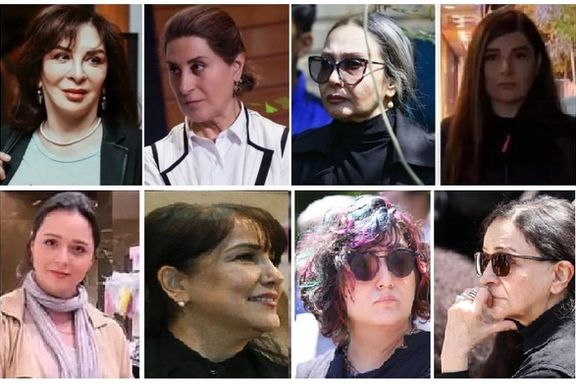
The head of Iran's Cinema Organization has defended the ban on several actresses who removed their hijab in solidarity with the Woman, Life, Freedom protests last year.

The head of Iran's Cinema Organization has defended the ban on several actresses who removed their hijab in solidarity with the Woman, Life, Freedom protests last year.
The anti-regime protests in 2022 gained momentum following the tragic death of Mahsa Amini while in hijab police custody, leading to a wave of outrage. In a show of solidarity with the protests, a number of Iranian actresses publicly shared images of themselves without the obligatory hijab.
The government official in charge of strictly regulating the cinema industry, Mohammad Khazaei, indirectly mentioned that the condition for lifting the ban on the actresses' work is an "apology for violating the mandatory hijab." He implied in a TV program that the ban's removal is contingent on the actresses "changing their approach."
Khazaei also pointed out that the legal authority for implementing the ban on the female artists lies with either the judiciary or security agencies, suggesting that the decision to prohibit their work had been made outside the realm of the Cinema Organization.
Responding to protests by filmmakers and cinema professionals who opposed the ban, Khazaei claimed that the Cinema Organization follows the orders and directives of the judiciary and security agencies.
Earlier, Mohammad Mehdi Esmaili, the Minister of Culture, once again confirmed the ban on actresses who had refused to wear the mandatory hijab. On October 25, Iran officially released a list of actresses who are now prohibited from working in the film industry due to their non-compliance with the hijab requirement.
The list of affected actresses includes several well-known figures in the Iranian film industry, such as Baran Kosari, Vishka Asayesh, Taraneh Alidousti, Katayoun Riahi, Panteha Bahram, Hengameh Ghaziani, Pegah Ahangarani, and others.
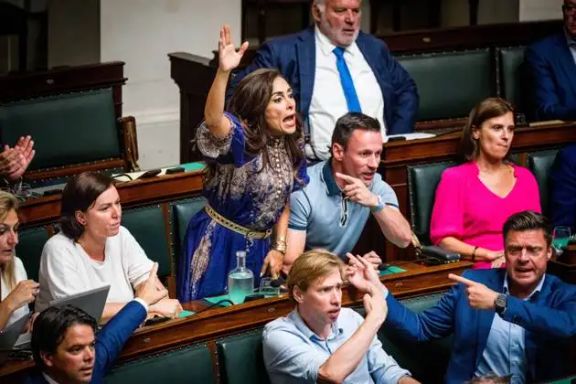
An Iranian-born European lawmaker has condemned attempts to silence her with the label of ‘Islamophobe’, especially since the current conflict began in the Mideast.
Darya Safai, a member of the Belgian parliament, mentioned on her X account that some individuals are attempting to silence her by labeling her as an 'Islamophobe.'
Safai is also a member of the Parliamentary Assembly of the Council of Europe.
“What the world is experiencing today is much broader than a war between Israel and Hamas. It is a broad war that shows the direction for certain Muslims to ultimately achieve their goals," she said, highlighting the Muslims’ promised goal to conquer the world and establish an Islamic rule.
“A goal promised to them in their holy book. In the eyes of Islamists, this is a war between Muslims and Israel/West in order to eventually form and conquer a great ummah as the ultimate goal,” said Safai, who has been one of the most vocal European politicians against the violations of human rights by the Iranian regime.
Expressing what many Iranians feel, Safai said, “Criticizing a religion or an ideology, like criticizing Islam, is not something that can be compared to racism or fascism.”
She touched upon an issue often discussed in Iranian social media and said that people who are in line with the Islamic Republic’s propaganda aim to silence all voices of reason. “These shouters do insinuate this and, in this way, try to silence the critics with their term 'Islamophobia’”, she added.
Safai also pointed out that phobia is an unreasonable fear of something, arguing that fear of what Islamist extremists can do is a genuine fear justifiable by the history of deadly attacks on peaceful activism by Islamists.
“Anyone who has grown up in a country where Sharia law is the law, and has experienced it first-hand, has reasons enough to be afraid of the destruction Islam can create," she said.
The regime in Iran killed about 600 people and arrested 22,000 people in 2022-2023 just to prove that the regime did not kill a 22-year-old girl for hijab defiance. “Despite what some naive people try to make us believe here in the West, Islam is not the religion of love and peace, but an ideology that promises its followers a glorious victory, and everything necessary to follow that path, even jihad and terror, is justified,” Safai said.
Vowing that she would “not be silenced by being intimidated with the label Islamophobe,” she said, “I am not afraid and will resolutely continue my work with everything in my power. As a politician it’s my duty to protect Europe and our society from these extremists and I will continue to do so.”
Her remarks echoed a similar sentiment by a large number of Iranians who have become especially vocal about their opposition to the Islamic Republic’s narrative of the Middle East conflict.
On Thursday, Ali Rabiee, a spokesman for former Iranian president Hassan Rouhani, implicitly confirmed the high number of Iranians who support Israel in the war against Hamas, which declared war on Israel October 7, when its forces killed 1,400 Israelis and took over 230 hostages.
Rabiee described the Iranians’ pro-Israel stance as an act of oppositional defiance against the Islamic Republic, derived from decades of justifying hefty investment in militant Palestinian and other groups. Some Iranians stand with Israel in the conflict based on their “national oppositional defiance” against the Islamic Republic, he said.
Since the Hamas terror operation it codenamed al-Aqsa Flood (Storm in Persian), Iranians have become even more vocal about their distance from the Islamic Republic’s narrative of the conflict, making trendy hashtags like #IranStandsWithIsrael or chanting creative slogans about where the regime should put the Palestinian flag.
An emotional funeral for a young Israeli soldier of Iranian origin killed in the Hamas attack went viral earlier this week. People saw a video of Shirel Haeimpour’s grandfather singing a traditional Jewish love song and a wedding song with his Esfahani Persian accent for the young woman.
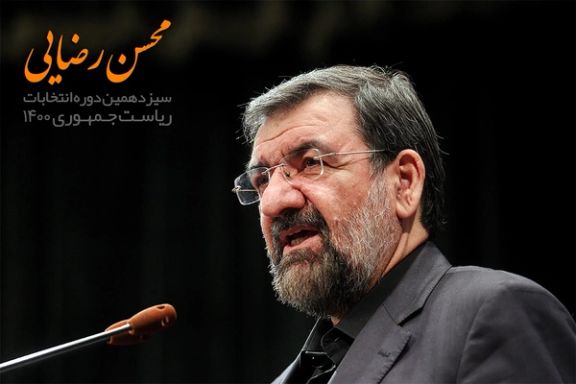
The former commander of the Iranian Revolutionary Guards, Mohesen Rezaei, says pivotal events are on the horizon in Palestine in coming days.
Speaking on Saturday, Rezaei emphasized that Iran cannot remain indifferent to global issues, asserting that the world is increasingly interconnected with Iran's interests. He also claimed that Iran's presence beyond its borders is aimed at “minimizing potential threats within its own territory while ensuring regional stability.”
His comments come as numerous Iranians find it objectionable that their nation's resources are channeled into backing proxy forces across the region, such as in Lebanon, Palestine, Syria, and Yemen. They believe such activities create international friction involving Iran and Iranians, at a time when the urgent needs of the people are being overlooked.
However, Rezaei stated that Iran is not actively seeking war but is “unafraid of it if necessary.” He referred to Hezbollah leader Hassan Nasrallah's speech the previous day.
Nasrallah on Friday commented on the ongoing conflict between Hamas and Israel saying that the decision to launch the October 7 attack on Israel by Hamas was entirely a “Palestinian decision.” There have been claims of Iranian and Hezbollah involvement in planning the attack, with reports of meetings in Beirut and Damascus since April.
Some social media users mocked Nasrallah's statements, suggesting that he refrained from direct involvement in the ongoing conflict, fearing potential US repercussions.
Others pointed out that, similar to Iran's ruler Ali Khamenei, Nasrallah limited his threats to verbal rhetoric and has not actively support Hamas in the war, in line with previous US warnings to both parties.

The scandal-plagued Iranian ex-ambassador to the UN, Mohammad Jafar Mahallati, is being investigated for allegedly promoting Hamas and antisemitism at Oberlin College.
The walls are closing in on the self-described “Professor of Peace,” Mahallati, who has faced accusations from Amnesty International in two reports for covering up the Iranian regime’s massacre of 5,000 dissidents while serving as ambassador to the UN in 1988.
According to a late September US Department of Education Office for Civil Rights (OCR) letter obtained by Iran International, “OCR will investigate whether the College failed to respond to the harassment of students based on national origin (shared Jewish ancestry).”
Mahallati’s alleged antisemitism and praise of the US and EU-designated terrorist movement Hamas is one part of the OCR investigation, said Melissa Landa, a 1986 graduate of Oberlin College, who filed the complaint in 2019 against the small liberal arts college.
Landa told Iran International “Through his lectures and reading assignments, Mahallati glorifies Hamas and teaches his students to do the same. He also delegitimizes Israel by characterizing the Jewish state as a settler colonial endeavor.” She added that “Mahallati should be fired.”
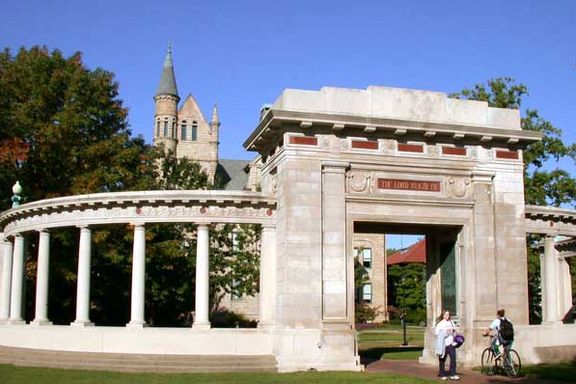
The OCR complaint cites Mahallati in connection with “support for Hamas and terrorism.” The jihadi terrorist organization Hamas, which rules the Gaza Strip, slaughtered 1,400 people in southern Israel on October 7. Hamas kidnapped over 240 people.
The complaint cites Mahallati in connection with “support for Hamas and terrorism.”
The stakes are high for Oberlin College. According to the New York Post, “Oberlin College in Ohio could lose chunks of the millions in annual federal funding because of the probe, whose existence it has not yet disclosed to students, alumni and donors. Last year, the school took in more than $5 million in federal grants.”
After Iran International sent press queries to Mahallati and Oberlin College President Carmen Twillie Ambar, the college on Friday sent out a mass email titled “Important Message for the Oberlin Community.” According to the email, which was obtained by Iran International and not published on the college’s website, “In light of recent tensions stemming from the conflict in the Middle East and heightened concerns about antisemitism on college campuses across the country, we wanted to inform you of a letter we received from the United States Department of Education Office for Civil Rights (OCR).”
The college added “Only now, in 2023, did we receive notice of the complaint and a request for more information from the OCR. Oberlin is cooperating with the OCR and working to respond to the request.
We abhor antisemitism and all forms of hate, discrimination, and harassment. We work every day to ensure that our campus is safe for all students, faculty, and staff, including those who identify as Jewish. Antisemitism has no place on our campus.”
Iran International press queries to Ambar and Mahallati were not immediately returned. It is unclear why Ambar refused to share the information about the OCR investigation on the college’s website. Ambar has not taken any action against Mahallati despite numerous complaints about his role in covering up the mass prisoner killings in 1988. She issued a report whitewashing his alleged crimes against humanity, according to Shirin Ebadi, the Iranian Nobel laureate.
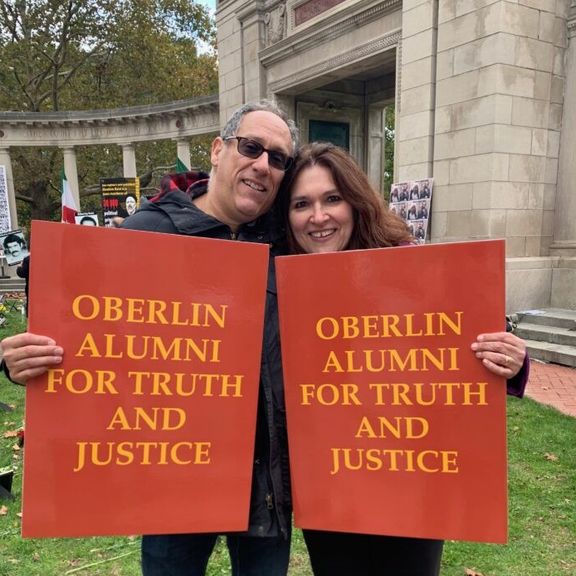
Ambar has also shunned the family members of the executed Iranians who asked to meet with her about Mahallati’s alleged war crimes.
The New York Post noted that “Students boycotted Mahallati’s classes, which were canceled in the spring." A spokeswoman for Oberlin told the paper that Mahallati was on “sabbatical” this teaching term. Iran International can confirm that students are boycotting the disgraced professor’s classes, including students who walked out of one of his teaching sessions.
Student clubs also refused to work with Mahallati during the effort to provide aid to Turks and Syrians during the ferocious earthquake that hit the region in February.
Landa, who founded the Alliance for Israel to counter the Boycott, Divestment and Sanctions (BDS) campaign targeting Israel and hostility toward Jewish students for their support of Israel, has worked with the Iranian-American organization, Alliance Against Islamic Regime of Iran Apologists (AAIRIA).
Lawdan Bazargan, who runs the broad-based coalition group AAIRIA, has campaigned to oust Mahallati’s from his college position since 2020. Landa and Bazargan spoke at a protest against Mahallati on the campus of Oberlin in November 2021.
Bazargan, whose brother Bijan was murdered by the regime for his left-wing views in 1988, said at the demonstration, “We want Oberlin College to fire him because Amnesty International accused him of crimes against humanity.”
The lighting rod issue of Mahallati has also spilled over to a city council campaign in Oberlin College.
Dr. Frieda Fuchs, who is a member of AAIRIA, and has penned a critical Iran International opinion article against Mahallati and his ally, Oberlin city councilmember, Ray English, said “A key point in Mahallati’s teaching is that the labeling of Hamas as a terrorist organization is evidence of Islamophobia. Mahallati’s supporters, like the former Director of Libraries at Oberlin College, Ray English, have characterized the organization of the relatives of the Iranian victims of the 1998 prison massacres (AAIRIA) who campaigned for the removal of Professor Mahallati from teaching, as a Zionist-supported right-wing organization.”
Fuchs added that even though many of the “1988 victims were leftist revolutionaries, that the organization has brought together people of various political orientations, and that there is no evidence whatsoever to sustain such a claim. Finally, during my electoral run for a seat on the Oberlin City Council, I have been subjected to a slanderous email campaign by Professor Matt Berkman from Jewish Studies, most likely because of my support for AAIRIA and advocacy against Mahallati.”
Berkman, who is seeking tenure at Oberlin College, faced criticism from Fuchs for his efforts to whitewash the evidence that Mahallati covered up the mass murder of Iranian political prisoners. Text messages reviewed by Iran International between Berkman and Fuchs state that Berkman is not sure “whether Mahallati had knowledge about them.” Berkman also dismissed Mahallati’s repeated calls for a global violent Jihad against Israel and the destruction of the Jewish state as “not very credible at all.”
Berkman advocates for the BDS movement, which the German and Austrian federal parliaments have defined as antisemitic. According to the website Carnary Mission, which tracks alleged extremist and antisemitic academics, Berkman “glorified violent protests” and supports an allegedly far-left fringe Jewish group that has faced allegations of being pro-Hamas. Berkman’s hostility toward Israel mirrors Mahallati’s reported antisemitic statements, argue his critics.
Numerous Iran International press queries sent to English and Berkman were not immediately answered.
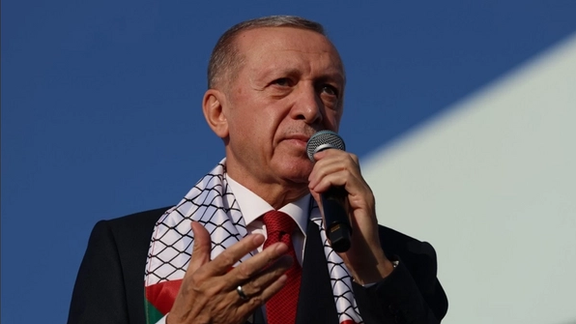
Turkish President Tayyip Erdogan told reporters that his Iranian counterpart Ebrahim Raisi would visit Turkey at the end of November to hold talks on Gaza.
Speaking to reporters on his return flight from Kazakhstan on Friday, Erdogan said there would no longer be any trust in the global system if Israel was not stopped and held accountable for what he described as "its war crimes and human rights violations", broadcaster Haberturk and others reported.
Turkey, Iran and Qatar form an informal alliance that supports Hamas and other Islamist militant groups in the Middle East. While the Persian Gulf Arab states have issued customary condemnations of Israeli attacks in Gaza, they see Hamas as a proxy force of the Iranian regime.
Although Erdogan has encouraged pro-Hamas rallies in Turkey, he told Raisi on October 16 that all efforts must be aimed at preventing the Hamas war from escalating and spreading in the region.
The Iranian regime celebrated the October 7 terror attack immediately as it was still taking place. However, it has avoided getting directly involved in the ensuing conflict. The Lebanese Hezbollah, Iran’s main proxy militia in the region has also avoided a full conflict with Israel.
Erdogan also said he would attend a summit of Muslim countries in Riyadh later this month.
According to the Turkish president, the Organisation for Islamic Cooperation (OIC) would push for a ceasefire and discuss the parameters of such a move during its summit in Riyadh later this month.
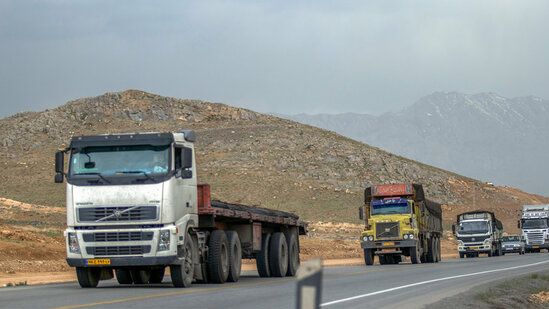
An Iranian official has revealed that economic hardships coupled with the government's inattention to the demands of truck drivers, have led many to opt for emigration.
Vice President of the Association of Truck Drivers, Jalal Mousavi, drew a vivid analogy to illustrate the driving factors behind Iranian truck drivers' pursuit of opportunities abroad. He likened their emigration to Europe and Canada as a journey to paradise, shedding light on the challenges and motivations that underlie this significant trend.
Mousavi emphasized the strenuous conditions under which Iranian drivers operate within their home country, highlighting how such challenges have equipped them to face the demanding tests and requirements of European roadways. He also noted that Iranian and Pakistani drivers tend to experience higher acceptance rates when venturing overseas in pursuit of new opportunities.
During his Saturday conversation with ILNA news website in Tehran, Mousavi pointed out that “countries like Germany and Canada present more favorable conditions for the acceptance of Iranian drivers, making them appealing destinations for those seeking a better future.”
He also shared examples of government officials actively seeking to obtain commercial driving licenses, motivated by the desire to migrate for improved prospects.
Mousavi noted that the harsh economic conditions, including an overabundance of trucks and decreased cargo volume, have substantially reduced drivers' income, fueling the desire for migration.
He stressed that Iranian drivers, frequently operating aged trucks under challenging conditions, perceive emigration as a path to a brighter future.